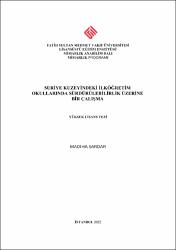| dc.contributor.advisor | Aytuğ, Ayfer | |
| dc.contributor.author | Sardar, Madıha | |
| dc.date.accessioned | 2023-02-17T13:29:30Z | |
| dc.date.available | 2023-02-17T13:29:30Z | |
| dc.date.issued | 2022 | en_US |
| dc.identifier.citation | SARDAR, Madıha, Suriye Kuzeyindeki İlköğretim Okullarında Sürdürülebilirlik Üzerine Bir Çalışma, Fatih Sultan Mehmet Vakıf Üniversitesi Lisansüstü Eğitim Enstitüsü Mimarlık Anabilim Dalı Mimarlık Programı, Yayımlanmamış Yüksek Lisans Tezi, İstanbul 2022. | en_US |
| dc.identifier.uri | https://hdl.handle.net/11352/4285 | |
| dc.description.abstract | Günümüzde sürdürülebilir kalkınmanın artan önemi ile birlikte enerji tüketimi ve yenilenebilir enerji yöntemlerinin kullanımında güvenli ve kolay çözümler bulmak için sürdürülebilirlik kavramı gündemdeki yerini almıştır. Sürdürülebilirlik kavramının çevresel, sosyal ve ekonomik boyutları gerçek sürdürülebilirliğe ulaşmamızı sağlamaktadır. Çoğu zaman bu kavramın gelecek nesiller için önemi nedeniyle eğitim bilimlerine de odaklanılmaktadır.
Okul; eğitim sürecinin başarısı için önemli bir dayanaktır, bu nedenle bir okul doğru fiziksel ve psikolojik standartları sağlamalıdır. Savaş sonrası okullarda sürdürülebilirlik standartlarının uygulanmasının önemi buradan kaynaklanmaktadır.
Suriye'deki krizin üzerinden 10 yıl geçmesiyle birlikte, öğrencilerin eğitimlerini yarıda bırakmaması için okulların inşa edildiği ve daha önce mevcut okulların yenilendiği bazı güvenli bölgelere ulaşılmıştır. Bu bölgelerde temel eğitimin (ilköğretim) seçildiği görülmektedir ve temel eğitimin seçilmesinin sebebi; bu dönemin öğrenciler için hassas bir dönem olması ve gelecekte çocuklar üzerinde en büyük etkiye sahip olmasıdır. Sürdürülebilirlik standartlarını karşılayan okullar inşa edilerek çevresi için sorumluluk alan güçlü bir nesle ulaşmamız mümkün olmaktadır.
Çalışmamızda, bu alanlardaki okul binalarını incelemeyi, Suriye'deki eğitim binalarının durumuna ışık tutmayı amaçlamaktayız. Bu çalışmada uluslararası ve komşu örneklerin analizi ile karşılaştırma yaparak Kuzey Suriye'de halihazırda güvenli kabul edilen alanlardaki okul binalarını entegre sürdürülebilirlik kriterleri üzerinden analiz etmeyi ve değerlendirmeyi amaçlamaktayız.
Bu çalışma, sürdürülebilirlik standartlarının okullarda, özellikle de Suriye'nin kuzeyindeki okullarda uygulanmasının önemine, eski okulların benimseyebileceği ve kamplardaki veya Suriye'nin kuzeyindeki güvenli bölgelerdeki kurulan yeni okulların inşasında da uygulanabileceği bir dizi öneriye ulaşmaktadır. Çalışma, kaynakların az olmasını göz önünde bulundurarak, öğrencilerin psikolojik ve fiziksel sağlıklarını olumlu yönde etkileyecek ve eğitim seviyesini yükseltecek şekilde sürdürülebilir entegre okullar üretmek için çevresel ve sosyal boyutun yanı sıra sürdürülebilirliğin ekonomik tasarruf sağlayan yönlerinin de dikkate alınmasını önermektedir. | en_US |
| dc.description.abstract | Today, with the increasing importance of sustainable development, the concept of sustainability has taken its place on the agenda to find safe and easy solutions for energy consumption and the use of renewable energy methods. The environmental, social and economic dimensions of the concept of sustainability allow us to reach true sustainability. Often this concept also focuses on educational sciences because of its importance for future generations. Education is the basis for the development and progress of nations, and the basis for creating strong and balanced generations.
The school is an important pillar for the success of the educational process, so this place must provide the correct physical and psychological standards. With this importance of sustainable schools comes the importance of applying sustainability standards in post-war areas.
With the passage of 10 years since the crisis in Syria, some safe areas have been reached, in which schools are currently being built, and previously existing schools are being renovated, to avoid the risk of students dropping out. The stage of basic education (primary schools) was chosen because it is considered a sensitive period for students, and it will have the greatest impact on them in the future. By building schools that meet sustainability standards, we can reach a strong generation that bears its responsibilities towards the environment around it.
This study aims to analyze school buildings in these areas to shed light on the humanitarian situation in Syria and to see the reality of educational buildings there.Compare it with the analysis of global and neighboring examples that will be studied. This study reaches the importance of applying sustainability standards in schools in general, especially in the schools of the north of Syria, through a set of proposals that can be adapted through which the old schools and also in the construction of new schools that are established, whether in the camps or safe areas in the north of Syria. Where the study recommends taking into account the aspects of sustainability that achieve economic savings along with the environmental and social aspect to produce sustainable integrated schools in light of the few possibilities available, in a way that positively affects the psychological and physical health of students and raises the level of education. | en_US |
| dc.language.iso | tur | en_US |
| dc.rights | info:eu-repo/semantics/openAccess | en_US |
| dc.subject | Sürdürülebilirlik | en_US |
| dc.subject | Sürdürülebilir Mimarlık | en_US |
| dc.subject | Sürdürülebilir Okul | en_US |
| dc.subject | Eğitim | en_US |
| dc.subject | Suriye’nin Kuzeyindeki Okullar | en_US |
| dc.subject | Sustainability | en_US |
| dc.subject | Sustainable Architecture | en_US |
| dc.subject | Sustainable School | en_US |
| dc.subject | Education | en_US |
| dc.subject | Schools in the North of Syria | en_US |
| dc.title | Suriye Kuzeyindeki İlköğretim Okullarında Sürdürülebilirlik Üzerine Bir Çalışma | en_US |
| dc.title.alternative | A Study on Sustainability in Primary Schools in North of Syria | en_US |
| dc.type | masterThesis | en_US |
| dc.contributor.department | FSM Vakıf Üniversitesi, Lisansüstü Eğitim Enstitüsü, Mimarlık Ana Bilim Dalı Ana Bilim Dalı | en_US |
| dc.relation.publicationcategory | Tez | en_US |
| dc.contributor.institutionauthor | Sardar, Madıha | |



















